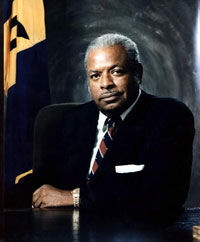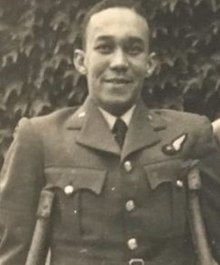PEOPLE - Black Pilots in WWII
- thefusters
- May 4, 2022
- 3 min read
Updated: Jun 26, 2022
The Unsung Story of RAF Black Pilots in WW2
Prior to 1940, Britain enforced a colour bar in its armed forces, stipulating that officers be of ‘pure European descent with few exceptions. After losses sustained at the start of WWII, however, the Royal Air Force (RAF) lifted its colour ban and actively recruited volunteers from both Africa and the Caribbean. About 500 aircrew (i.e., pilots, navigators, gunners and flight engineers) and 6,000 ground crew answered the call. More than 25% of these men were decorated and one third were killed in action.

Though almost no Black pilots served in the British air force before WWII, the first such trailblazer was Sergeant Robbie Clarke (Jamaica), who few REI biplanes with 4 Squadron Royal Flying Corps over France in 1917.
Born in Kingston, Jamaica, on 4 October 1895, Clarke paid his own passage to Britain at the outbreak of the war and joined the Royal Flying Corps (RFC) on 26 July 1915, serving as an air mechanic, then driver with an observation balloon company in France. Craving to fly, however, he was accepted for pilot training in England, winning his wings on 26 April 1917, and promoted to sergeant.
On 29 May 1917, while flying a R.E.9 biplane over Abeele, Belgium, on a reconnaissance mission with 4 Squadron RFC, Clarke managed to land his plane with an enemy bullet in his spine, saving his life and that of his observer. After the war, he returned to Jamaica where he worked in the building trade and became an active veteran and Life President of the Jamaican branch of the Royal Air Forces Association.
William Robinson Clarke, the first Black pilot to fly for Britain, died in April 1981. He is buried at the Military Cemetery at Up Park Camp, Jamaica. https://www.rafmuseum.org.uk/research/online-exhibitions/pilots-of-the-caribbean/heroes-and-sheroes/pioneer-sergeant-william-robinson-clarke/

Author Mark Johnson in his book, Caribbean Volunteers at War, highlights the day-to-day reality of life as a Caribbean volunteer during the Second World War. With insights from conversations with his great-uncle, Flight Lieutenant John Blair DFC (Below right), Johnson reveals the kind of culture-clash experiences that characterised their wartime careers.
Mark Johnson delivers a talk based on his book at: https://media.nationalarchives.gov.uk/index.php/untold-story-raf-black-second-world-war-fliers-europe/
Flight Lieutenant Blair served with
Bomber Command's No. 102 (Ceylon) Squadron
over the skies of Germany and was awarded
the Distinguished Flying Cross.
Highlighted below are a very few of these brave men who answered the call. Much more information can be found at https://www.rafmuseum.org.uk/research/online-exhibitions/pilots-of-the-caribbean/across-the-commands/the-second-world-war-1939-to-1945-across-the-commands-part-2/

Flight Lieutenant Vincent Bunting (Left, Jamaica) flew Spitfires with 611 Squadron and Mustangs with 154 Squadron, shooting down Luftwaffe FW-190 fighters near Lübeck, Germany in 1945. https://bhmm.org.uk/event/morning-talk-flight-lieutenant-vincent-bunting/
Flying Officer Arthur O. Weekes (Barbados, 132 Sqn) was also credited with shooting down Luftwaffe FW-190 fighters in Germany in 1945.
Pilot Officer Collins A. Joseph (Trinidad), who served with both 132 Squadron and 130 Squadron, was killed by friendly fire over Germany on 31 December 1944.
See www.caribbeanaircrew-ww2.com/?p=94 for photos and additional information regarding FO Weekes and PO Joseph.
Warrant Officer James Hyde (Trinidad) flew Spitfires (132 Sqn) and was killed when shot down by German Fighters over Nijmegen on 25 September 1944. Pictured as a Flight Sergeant with the Sqn’s mascot, Dingo, at https://www.rafmuseum.org.uk/research/online-exhibitions/pilots-of-the-caribbean/across-the-commands/the-second-world-war-1939-to-1945-across-the-commands-part-2/

Flying Officer E.W. Barrow (Barbados) flew as a navigator on Lancaster bombers of 88 Sqn RAF; and later became the Prime Minister of Barbados. https://www.rafmuseum.org.uk/research/online-exhibitions/pilots-of-the-caribbean/heroes-and-sheroes/stateman-flying-officer-errol-walton-barrow/

Flight Lieutenant Billy Strachan (Jamaica) –Initially trained as a Wireless Operator and Air Gunner Sergeant Strahan finished 30 missions with 156 Squadron. Entitled to a ground job, he chose to retrain as a pilot and flew both Wellington and Lancaster bombers in the Squadron’s Pathfinders role. In later life, Flight Lieutenant Strachan became a jurist and civil rights activist. (Photo:

Flight Lieutenant John Smythe OBE (Sierra Leone) flew as a navigator on Short Stirling bombers with 623 Squadron. On November 18, 1942, on his twenty-eighth mission, his bomber was shot down. Wounded, he spent the duration of the war in a POW Camp. In 1961, he became the Solicitor General of the newly independent Republic of Sierra Leone. In 1978, he was awarded Officer of the Order of the British Empire.
References and additional information:
The Motherland Calls, Stephen Bourne, ISBN 978-0752465852
Caribbean Volunteers at War, Mark Johnson, ISBN 978-1399010160

.jpg)
Comments